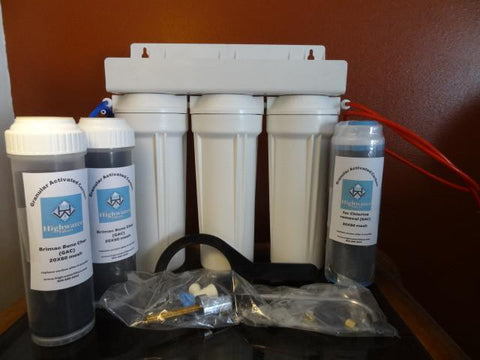Gut bacteria and health. Could your tap water play a role?

By Lorraine Marie
Basic rule of thumb: if you smell it and taste it and think “ew,” rethink drinking it…especially if it’s municipally-treated water.
Sure, treated city water dodges the plague; adding chlorine is a cheap g’bye to cholera, dysentery, typhoid, giardia lamblia, and salmonella. And to other nasties like parasites, fungi, various bacteria, viruses, algae, radium, mercury and arsenic. (Sadly, unsafe water causes the death of 1.8 million people annually; 94% of those deaths are preventable.)

To “safely” drink water we’re looking at “don’t let the perfect get in the way of the good.” Turning bad water into “good” but not perfect water drives municipalities to use chemical cocktails that include lime, soda ash, sodium hydroxide, carbonic acid, hydrochloric acid, sulfuric acid, aluminum sulfate, iron III chloride, activated alumina, calcium oxide, sodium carbonate, chlorine, and chloramines. And some add fluoride.
A question we never entertained when this all began: how’s this affect your gut bacteria? A clue: “Recent studies have shown that changes in gut microbial populations caused by chlorine or other chemicals in drinking water influence the development of human colorectal cancer,” quoting PLosOne (7-17-15). Animal studies also show reproductive abnormalities linked to chlorine.
The ideal gut bacteria is 80% good bacteria, 20% bad. The gut is where 65% or more of immune activity takes place. Upset that bacterial ratio and science is pointing to a list of woes:
- poor digestion, including Irritable Bowel Diseases,
- weakened immunity,
- autoimmune diseases, (including Crohn’s, Ulcerative colitis, Psoriasis, Rheumatoid arthritis, Fibromyalgia...see list of over 100 autoimmune diseases here.)
- weight problems and obesity (altering gut bacteria impacts obesity in lab rats),
- mental health challenges,
- allergies,
- liver disease,
- chronic heart disease,
- intra-abdominal abcesses,
- bloat, abdominal pain, diarrhea,
- unhealthy skin,
- colorectal cancer (second leading cause of cancer in the U.S.),
- cancers like breast and prostate,
- hypertension,
- osteoporosis,
- diabetes, (Type II has been reversed with healthy fecal transplants, amply demonstrating the power of healthy micro-flora --google Dr. Max Niewdorp),
- poor sleep,
- rheumatic diseases,
- kidney diseases,
- autism (many autistic children demonstrate gut imbalance with diarrhea, even “explosive” diarrhea, and abdominal pain).
Startling: Alzheimer’s is also on the list. Sweden’s Lund University, in Scientific Reports, says unhealthy gut flora speeds the development of Alzheimer’s.
For every study showing the link between chemical exposure’s assault on gut bacteria, you will likely encounter “we see the connection; now to unravel the underlying dynamics.” While the science world investigates further, we are forewarned, and able to minimize our chemical exposures as much as possible. This starts not just with diet but with the home water supply. No use killing the friendly bacteria as fast as you install them.
What about fluoride and the gut microbiome? For now, there’s speculation. But a Harvard meta-analysis of 27 fluoride studies, funded by the National Institutes of Health, determined that children drinking highly fluoridated water have lower IQs; fluoride causes neurotoxicity, impacting learning and memory. Could this be yet another case of imbalanced gut bacteria affecting brain function?*
Keep your favorite Science periodical bookmarked to find out more about how gut bacterium affects our brain health. More is being discovered every day.
There’s a Filter for That!
What Can You Do?
Luckily, there are plenty of options for water filters that will not only improve odor and taste, but protect you from the chemicals used to disinfect your water. No need to lug cases of questionable bottled water that fill up the fridge and our landfills. There are easy-to-install, reasonably priced solutions that can save you. In multiple ways. At Highwater Filters, there's a solution just for you.
Make sure you check with your local municipality to find out what they use to treat your water. If they use chloramine, you will want to use a GAC (granular activated carbon) filter that treats that specifically. If they treat with chlorine, you will want to use a GAC for chlorine or a carbon block filter. Many cities add fluoride to the water. If you have concerns about fluoride in your drinking water, we recommend adding a bone char filter to your system.
We realize that it can be a confusing decision to choose the right filter for your needs. We welcome your emails and calls with questions. If we don’t have the answer, we will do our best to find it.
Got a question? email us at info@highwaterfilters.com
or call 509-685-0933

















2 thoughts on “Tap Water, Gut Bacteria and Health. Should You Worry?”
Hilary
Hi Antony, Good point. If you are filtering municipal water it is probably already void of bacteria from disinfectants. You’ll want to make sure you have a carbon filter to remove them. For well water, it’s probably best to err on the side of caution and remove bacteria. Hopefully, we are getting the bacteria we need from our food. Perhaps a water test could help you decide whether you need it.
Antony Smith
Hi, I use a brita filter for my drinking water currently. The water looks and tastes cleaner which is good. However I do wonder since the filter system is removing pathogens and bacteria then is this bad for my microbiome in the gut because I imagine the gut replenishes bacteria not only from food but from bacteria in the water we are supposed to be drinking. Should I be filtering bacteria out at all. Then it’s catch 22 because there are other contaminants in the water from the processing of the water in water treatment works and picked up en route to my tap in pipe systems. Is there any measurement of bacteria still left over after water is filtered to ensure good gut health? Not sure which is the best analysis of this issue.
regards
Antony.